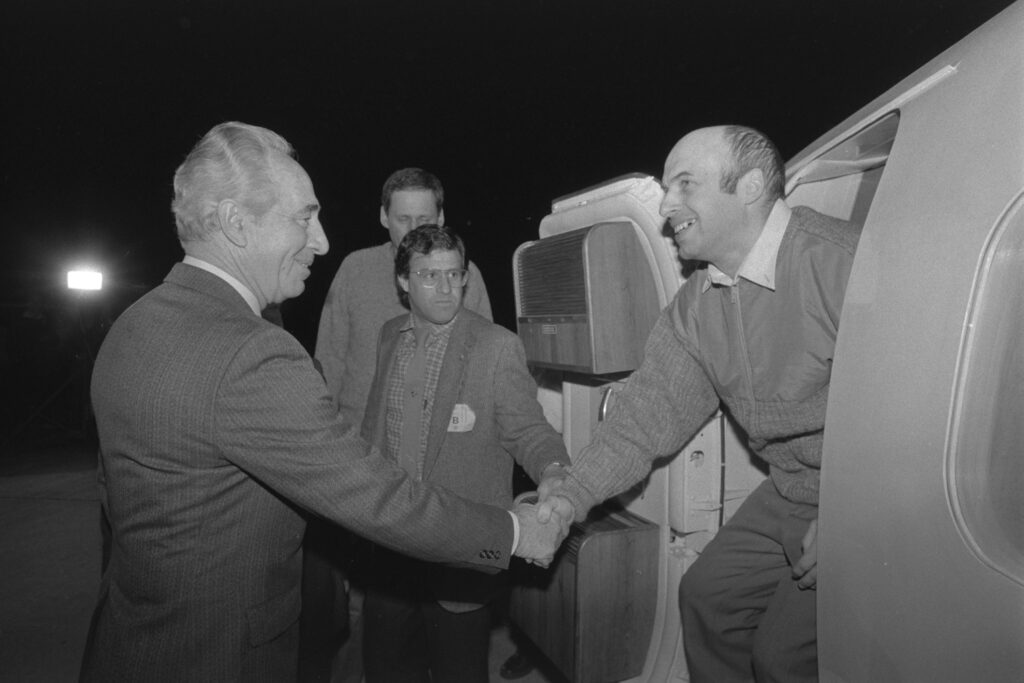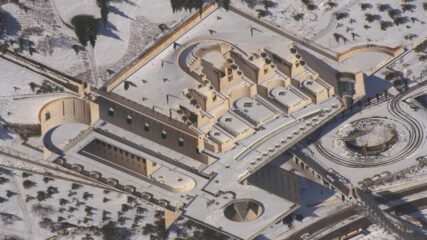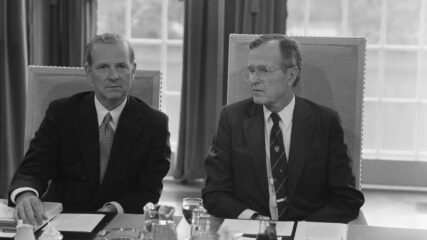Compiled by the Center for Israel Education, January 2023
February has historically been a month when the Zionist dream of a Jewish homeland and its defense confronted realities of world politics and diplomacy, from a pope rejecting Jewish emancipation and the U.S. State Department fighting partition to Zionists planning purchases of needed land amid Arab and British resistance and Israeli and Diaspora Jews working to help Soviet and Yemeni Jews make aliyah.
Feb. 1, 2003 — Space Shuttle Disaster
The space shuttle Columbia, which was damaged during launch 16 days earlier, disintegrates during re-entry to Earth’s atmosphere, killing all seven crew members. They include Israel’s first astronaut, Ilan Ramon, an Israeli Air Force pilot who was already a national hero for his role in the destruction of Iraq’s nuclear reactor in 1981.
Feb. 3, 1919 — Zionists at Paris Conference
A World Zionist Organization delegation at the post-World War I Paris Peace Conference makes the case for a Jewish homeland emerging from the proposed British Mandate in Palestine.
• Document: British Mandate for Palestine
Feb. 5, 1879 — An Electrifying Birth
Pinhas Rutenberg, the engineer largely responsible for bringing electricity to Palestine during the British Mandate and thus helping fuel the growth of the Jewish and Arab populations, is born in Ukraine.
Feb. 5, 1890 — Tu B’Shevat Takes Root
Educator Ze’ev Yavetz takes his students to plant trees on Tu B’Shevat, starting a Land of Israel tradition that the Jewish National Fund and teachers unions adopt in 1908.
Feb. 7, 1974 — Jewish Settlers Expand Presence
Responding to the Yom Kippur War, Rabbi Tzvi Yehuda Kook’s followers launch Gush Emunim (Bloc of the Faithful) to establish a permanent Jewish presence in the lands captured in June 1967.
Feb. 8, 2005 — End of the Second Intifada
A summit at the Egyptian resort of Sharm el-Sheikh ends with declarations that the Second Intifada is over after more than four years of violence and some 5,000 deaths.
• Document: Or Commission findings on the October 2000 outbreak of violence
Feb. 9, 1953 — Bombing Breaks Soviet Ties
A Jewish terrorist group bombs the Soviet Embassy in Tel Aviv, and the Soviet Union severs diplomatic relations. Soviet support was crucial to Israel’s War of Independence victory, but Israel has committed to the West in the Cold War.
• Document: Soviet Foreign Minister Andrei Gromyko’s U.N. remarks in support of Israel in May 1947
• Theme: Great Powers, the Middle East and the Cold War
• Video: Arab-Israeli Conflict: 1945 to 1949
Feb. 9, 1994 — Palestinian Self-Rule for Gaza, Jericho
Shimon Peres and Yasser Arafat build on the Oslo Accords of September 1993 by signing an agreement on security cooperation and Palestinian self-rule in Gaza and Jericho. Israel does not promise Palestinian statehood.
• Document: Oslo Accords
• Document: Yigal Allon in 1977 explains Israel’s conditions for negotiating with the PLO
Feb. 11, 1986 — Sharansky Free at Last
Anatoly Shcharansky is allowed to leave the Soviet Union after eight years in a Siberian labor camp and arrives in Israel as Natan Sharansky, a landmark in the movement for Soviet Jewry.
• Transcript: 2008 interview with Rabbi Avi Weiss, leader of the U.S. movement to free Soviet Jews
Feb. 11, 1995 — AJC Tries to Close Israel-Diaspora Gap
The American Jewish Committee adopts a policy emphasizing interdependence between Israel and the Diaspora after 45 years of highlighting the Jewish communities’ independence.
• Document: AJC’s new policy statement on Israel-Diaspora relations
• Analysis: President Isaac Herzog’s approach to the Diaspora
Feb. 12, 1958 — Constitutional Basics Without Constitution
The Knesset enacts the first of more than a dozen Basic Laws in lieu of a formal constitution. The first Basic Law focuses on the rules and functions of the Knesset itself.
• Documents: Israel’s Basic Laws
Feb. 13, 1931 — No Limits Yet on Jewish Immigration to Palestine
British Prime Minister Ramsay MacDonald rejects the Passfield White Paper, which proposes restrictions on Jewish immigration and land purchases in Palestine after the 1929 Arab riots.
• Document: 1922 White Paper and Arab response
• Document: 1930 White Paper
• Document: 1939 White Paper
Feb. 14, 1896 — ‘The Jewish State’
Theodor Herzl publishes his pamphlet promoting a Jewish homeland in response to antisemitism, “Der Judenstaat” (“The Jewish State”). He organizes the First Zionist Congress 18 months later.
• Document: “The Jewish State”
• Documents: Newspaper reports from the First Zionist Congress
Feb. 17, 1948 — State Department’s Anti-Partition Pitch
The State Department’s policy planning staff sends a memo unsuccessfully urging President Harry Truman to block the U.N. partition of Palestine, for which the United States voted.
• Document: U.N. General Assembly Resolution 181
• Videos: A three-part animated series explaining how and why partition happened
Feb. 18, 1577 — Persecution in Tzfat
The Jews of Safed (Tzfat), the largest Jewish community in Ottoman Palestine in the 16th century, petition the sultan for protection from persistent persecution by local officials.
Feb. 18, 1947 — British SOS on Palestine
Amid rising Jewish and Arab violence, the British government asks the United Nations to decide the future of Palestine. A special U.N. commission takes up the issue and calls for partition.
• Document: Summary of the report of the U.N. Special Committee on Palestine
Feb. 19, 1936 — Strategy for Land Purchases
Zionist leaders meet to discuss how to keep purchasing land for the growing Jewish population in Palestine as they construct a nucleus for the state. They expect the British to limit Jewish land and demographic growth, as happens in 1939.
• Document: 1939 White Paper
Feb. 19, 2009 — Escape From Yemen
The Jewish Agency secretly flies 10 of Yemen’s fewer than 300 remaining Jews to Israel to protect them from terrorist threats. Yemen had roughly 50,000 Jews in 1948.
Feb. 20, 1957 — Eisenhower Talks Tough on Sinai
President Dwight Eisenhower discusses the Middle East after the 1956 war and emphasizes the need for Israel to abide by U.N. resolutions, including withdrawal to the 1949 cease-fire lines.
• Transcript: Eisenhower’s televised speech
• Audio: Excerpt from the speech
Feb. 21, 1852 — Pope Says No to Jewish Citizens
Pope Pius IX protests Grand Duke Leopold II’s decision to grant a degree of emancipation to Jews in Tuscany. “The spirit of the church … has always been to keep Catholics as much as possible from having any contact with the infidels,” the pope writes.
Feb. 22, 1914 — Hebrew for Technion
The board of a technical college under construction in Tel Aviv adopts Hebrew as the language of instruction, reversing an October decision to teach in German. The college changes its name from the German Technikum to the Hebrew Technion.
Feb. 23, 1965 — First Oscar Nominee
“Sallah Shabbati” receives the first Academy Award nomination for best foreign language film for an Israeli movie. It loses the Oscar but wins a pair of Golden Globes.
• Excerpt: Scene from “Sallah Shabbati”










